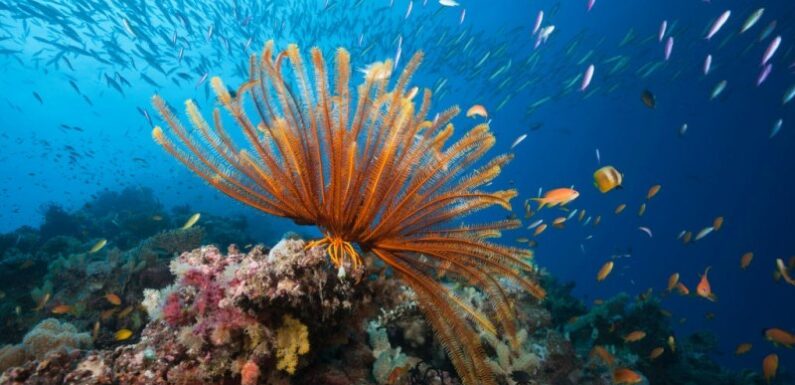
Save articles for later
Add articles to your saved list and come back to them any time.
Australia has been granted a stay of execution for the World Heritage status of the Great Barrier Reef from governing body UNESCO following the Albanese government upgraded Australia’s climate target, but the earth’s largest coral ecosystem has been put on probation due to the escalating damage from global warming.
World Heritage listings are controlled by the United Nations Educational, Scientific and Cultural Organisation (UNESCO) and it recommended against an immediate in danger rating for the reef, despite increasingly frequent coral bleaching events and deteriorating ecosystem health.
UNESCO has recommended against an immediate removal of the World Heritage status for the Great Barrier Reef. Credit: Getty
However, UNESCO said Australia “should be required” to demonstrate progress on protecting the reef next year, which comes as a warning that the organisation expects further gains in Australia’s climate and environmental policy to improve the ecosystem’s precarious health.
UNESCO’s recommendation is a win for the government, which upgraded Australia’s climate target after it won the May 2022 election, pledged additional funding of $200 million over 10 years for reef health and – along with the Queensland state government – invested hundreds of millions more in science, reducing polluted runoff from urban and agricultural land as well as banning gill net fishing.
“[Australia] has made significant progress to respond to the threat of climate change to the property and has made a series of strong commitments to reduce pressures on the [reef],” UNESCO said.
Federal Environment Minister Tanya Plibersek welcomed UNESCO’s decision and said it showed the progress Australia had made.
“UNESCO’s draft decision acknowledges that, under Labor, Australia is once again serious about protecting the Reef and acting on climate change,” Plibersek said.
The Albanese government also cancelled a major dam that was planned by the former Morrison government and vetoed a coal project in the reef’s catchment.
WWF Australia head of oceans Richard Leck said UNESCO had correctly recognised the government commitments to better protect the reef and said it was crucial they continued to upgrade emissions reductions to meet the goal of the Paris Agreement on climate change.
“To give the Reef a fighting chance, it’s vital the Queensland and Australian governments implement ambitious emissions reduction measures consistent with limiting warming to 1.5 degrees,” Leck said.
There have been five mass-bleaching events on the reef: 2002, 2016, 2017, 2020 and 2022. Scientists say global warming is the major factor driving more frequent bleaching and Australia’s climate has already warmed by an average of 1.47 degrees.
A report by the Australian Academy of Sciences said if the world warmed by 2 degrees, only 1 per cent of corals would survive.
UNESCO recommended in 2021 that the reef’s status be rated as in danger of losing its World Heritage listing, which experts said was driven in part by the Morrison government’s climate policy to cut emissions 26 per cent by 2030.
This target is consistent with global action that would lead to around 4 degrees of global warming, far higher than the goal of the Paris Agreement to limit warming to under 2 degrees and as close to 1.5 as possible.
But the Albanese government upped Australia’s climate action, setting a goal to cut emissions 43 per cent by 2030 and to reach net-zero by 2050, a goal that is consistent with 2 degrees of warming and still falls short of the Paris Agreement.
After UNESCO recommended the reef’s status be downgraded, the committee of 21 countries that determine World Heritage matters voted to defer a decision called for a monitoring mission in the meantime.
UNESCO sent in May 2022 scientists to assess the health of the reef, which coincided with a coral bleaching event that are becoming more frequent as climate change heats the globe. They found that the reef met the criteria for the list of World Heritage sites in danger of losing their status due to degraded environmental values.
The two most recent bleaching event occurred, for the first time, during La Nina weather cycles which typically bring cooler conditions. Now with a hot summer forecast scientists are warning of the likelihood of yet more bleaching again this year.
Cut through the noise of federal politics with news, views and expert analysis. Subscribers can sign up to our weekly Inside Politics newsletter here.
Most Viewed in Politics
From our partners
Source: Read Full Article
